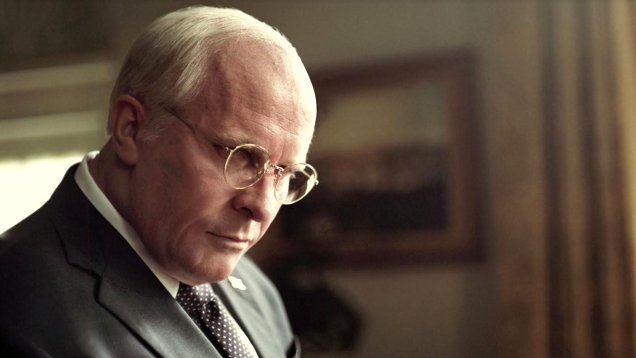The Dick Cheney biopic Vice is a slanted but entertaining political commentary

The Dick Cheney biopic Vice is a shaggy but entertaining film heavily critical of its subject, writes critic Luke Buckmaster.
Recently, while fossicking around online for an interview with director Adam McKay about his new Dick Cheney biopic Vice, my jaw literally dropped when I stumbled upon a tete-a-tete between two people in furious agreement. It wasn’t the fact that these feisty fellows disliked McKay’s (inevitably controversial) film that took me by surprise. It was that they managed to misread it so terribly they somehow saw it as a “sympathetic portrait of Cheney” that not only presents him as a “fairly likable shlub” but in fact “lionizes him.” Sympathetic? Likeable? Lionizes? Really?
I could have sworn I sat through every one of Vice’s 132 minutes, but I must have missed the scene presenting the former Vice President as anything more than a cat-stroking bastard with an axe to grind. It says something about the topsy-turvy mood of the current times that a film so clearly depicting its subject as a puppet master and wicked bugaboo is condemned for not coming down on him hard enough. Perhaps McKay should have inserted flashing text over every shot of Christian Bale, blinking the words BAD MAN BAD MAN BAD MAN BAD MAN on infinite repeat.
To be clear: you would have to be extremely partisan or extremely idiotic to suggest the real-life Cheney might have a decent bloke just trying to earn a crust. Any reasonable assessment would surely indicate he is a terrible man – or at least a man who has done terrible things. The core flaw of this shaggy but entertaining picture, fashioned in broadly the same zany style as McKay’s previous feature The Big Short, is that it fails to explain or even meaningfully pose questions about the core of its subject’s ideological beliefs. What is the war he is fighting? Why does he want to change the world?
To suggest that Cheney was simply power-hungry barely begins to cut it (and does nothing to recognise the complex nature of power in American politics). Nor is it insightful to simply label him a Big Bad Conservative. Cheney’s political beliefs are fundamentally important to this story, and yet McKay cannot seem to bear entertaining the idea that his subject has developed world views, however objectionable and/or however different to his own. That is the big vice, as it were, of this film – not the wacky narrative framework deploying various kinds of shenanigans, including numerous instances of fourth wall-breaking and elaborate gags such as fake end credits inserted before the film’s actual conclusion.
An opening text insert explains that Cheney has always been highly secretive, so the filmmakers “did our fucking best” to get the details right, falsely establishing Vice as an earnest attempt to ascertain truth. Soon the voice of a narrator is overlaid onto scenes depicting Cheney at the time of the 9/11 attacks, when he “saw an opportunity” and “forever changed the course of history”. Taken in isolation (without knowledge of real-life events) this would smack of simplification if not hyperbole. But by the time the writer/director eventually doubles back – after charting Cheney’s rise and various political endeavours – he has built a solid thesis, in the process memorably blurring the line between parody and political commentary.
At the centre of the show is a bulked-up and chin-dribbling Bale, whose entertaining performance is a slow moving special effect: heaving and growling and stinking up the screen with an eating-puppies-for-breakfast bastardy. Nevertheless he plays it straight in a film that’s bent in every direction. Bale lets the madness wash over him. You could scissor out his performance and paste it into a different (even lionizing) biopic and nothing about it would need to be changed. It is both bold acting and a complete artistic surrender.
But in a sense the best performance comes from McKay, or even from the film itself. For better or worse he and his film are always putting on a show. The context around Vice is the emergence of comedy as a viable form of political journalism, in an era of renewed interested in news satire and Colbert/Oliver/Micallef style editorialising. Except in this instance “journalism” is a bit much. Vice is more like straight for the jugular editorialising. A couple of weeks ago I would have sworn that while mixed opinions were inevitable about this film, everybody could agree that it is a scathing portrait of Cheney. The internet however proved me wrong.

















